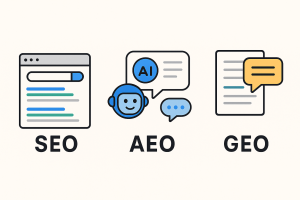Let’s be real—searching on Google today feels less like typing in keywords and more like whispering secrets to a digital mind-reader. It’s almost creepy how often you get exactly what you need before you even finish typing. And that leads us to the question on everyone’s lips: Does Google know what I’m thinking?
Spoiler alert: maybe.
Here are the top 5 tech updates hiding in plain sight on Google’s Search Engine Results Pages (SERPs)—and why they’re making all of us a little paranoid (in a good way).
- AI-Generated Snippets: The Psychic Search Bar
Ever searched something and had the answer pop up before you even clicked a link? That’s Google’s AI-generated snippets at work. Powered by natural language processing and years of machine learning, it scans top-ranking pages and delivers an instant summary.
So when you ask, “How long does it take to boil an egg?” and the answer magically appears, it’s hard not to wonder: Does Google know what I’m thinking? Yup, it kinda does.
- Multisearch: Show and Tell Gets an Upgrade
Thanks to Multisearch, you can snap a photo of your mystery object, add a few words, and let Google do the rest. Want that funky retro lamp in green instead of yellow? Just show it and say it.
It’s like Google looked at your camera roll and said, “I got you.” At this point, it’s fair to ask again: Does Google know what I’m thinking? Maybe not fully—but it sure knows what you’re looking for.
- Continuous Scroll: No More Page 2 Purgatory
Page 2 used to be where good content went to disappear. But now, with continuous scroll on mobile (and desktop catching up), users can just… keep scrolling. And scrolling. And yes, scrolling.
You’re getting more results, faster—and those results are curated based on your past behavior. So if it feels like Google’s tailoring your results to your vibe… well, does Google know what I’m thinking? It’s learning.
- Perspectives Filter: Humans Over Headlines
Google’s new Perspectives filter surfaces content from forums, Reddit, YouTube, and other user-generated sources. Instead of reading generic blog posts, you now get real people sharing real experiences.
It’s like Google stopped being a librarian and started being your well-connected friend. And when the search result feels eerily in sync with your train of thought, it’s time to ask one last time: Does Google know what I’m thinking? Okay, maybe not exactly—but it’s definitely trying.
- Generative Search Experience (GSE): Meet Your Search Sidekick
Still rolling out, but already impressive, Google’s Generative Search Experience combines AI summaries with traditional links and follow-up prompts. It understands your questions, adds context, and gives you a head start on complex topics.
Basically, it’s like having a research assistant that anticipates your next move before you make it.
And That’s the (Search) Tea
Google’s SERP has become a high-tech blend of AI, UX design, and subtle behavioral tracking. It’s fast, it’s smart, and yes—it’s kind of spooky. But spooky in a “my phone finishes my sentences” kind of way.
So next time you’re searching and the results feel a little too perfect, just remember: Does Google know what I’m thinking? Maybe not exactly… but it’s getting awfully close.











